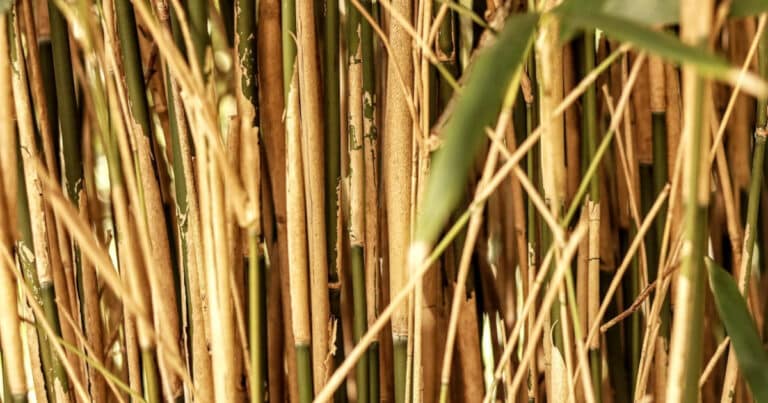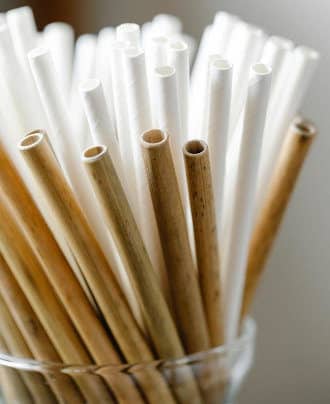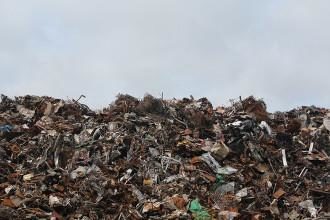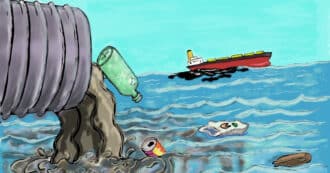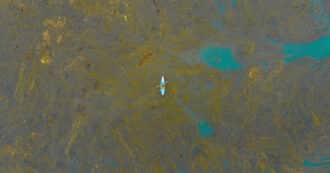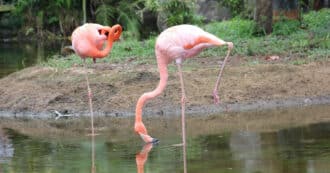By Sydney Cohen –Looking for a more sustainable option when it comes to straws? Check out bamboo straws! These environmentally friendly straws are made from natural bamboo, and they are biodegradable and compostable. They are also reusable, which makes them a great choice for eco-conscious consumers. Bamboo straws come in a variety of sizes and colors, so you can find the perfect one for your needs. Plus, they make a great addition to any eco-friendly home or office.
Bamboo is a fast-growing plant, and it doesn’t require any pesticides or fertilizers. It also grows in many different climates, so it is perfect for sustainable farming. Bamboo is also one of the most renewable resources on earth because it grows so quickly, so we, as humans, will not deplete this resource. Using bamboo straws helps to keep plastic out of our landfills and oceans. Not only are bamboo straws reusable, but reusable straws also make a great conversation starter, and send the message to others that you care about the environment, and make eco-conscious decisions!
The Problem With Plastic Straws
Did you know that the production of plastic straws uses vast quantities of fossil fuels and emits gases that contribute to climate change? It’s true! In addition, most plastic straws are not recyclable, which means they end up in our oceans and landfills. There is a movement afoot to eliminate the use of plastic straws, and increase the use of reusable straws, and for good reason.
Plastic straws have been in the news a lot lately. This is because of the growing awareness of the problem of plastic pollution. Plastic straws are one of the most common forms of plastic pollution. They are often used once and then thrown away, which means that they end up polluting our oceans and waterways. This is a huge problem, and it needs to be addressed.
There is a problem with plastic straws, and it’s not just that they’re made from plastic, whose production process can pose many environmental threats. But plastic straws are one of the most common items found in the ocean as it’s incredibly easy to throw away straws, and they’re wreaking havoc on marine life.
Plastic Pollution
According to the World Wild Life Fund (WWF), “Plastic pollution affects 88% of marine species.” They have deemed our world’s plastic pollution problem incredibly severe, and we even have “plastic islands,” a mass composite of plastic waste, floating through the Atlantic and Pacific oceans. “WWF has indicated that at least 2,144 species suffer from plastic pollution in their habitat, and some of these species also end up ingesting these materials. This is the case of 90% of marine birds and 52% of turtles, according to the report”.
As you can imagine, plastic waste as small as a disposable plastic straw can easily make its way into our waterways, and eventually the oceans, contributing to the already incredibly harmful plastic waste problem. Furthermore, the WWF report on plastic pollution “predicts that plastic production will double by 2040, which will cause a fourfold increase in plastic waste in the ocean. This will affect an area that is two and a half times the size of Greenland”, according to the WWF. A single straw hastily thrown into the trash can end up killing an animal – which is why we must find other alternatives to single-use plastic straws.
Eco-Friendly Straws
The environmental impacts of plastic pollution and plastic waste are why many people are choosing to make the switch to a reusable straw. Reusable drinking straws often come with a cleaning brush and can be made from a variety of more eco-friendly and sustainable materials.
NRDC Statement on Straws
The reason for the movement to reusable straws has a few explanations, according to the Natural Resources Defense Council (NRDC). They note that “of all the types of plastic trash we could regulate, there are a few smart reasons to target straws specifically. First, they’re pretty easy to do without—a low-hanging fruit in the vast battle against plastic disposables. Second, unlike many other single-use items, it’s essentially impossible to recycle straws…Third, there are a lot of them. Some estimates say hundreds of millions of straws are tossed each day in the United States alone”.
If you care about the environment and want to find solutions to our world’s plastic problem, the NRDC further recommends “following the gold standard in the fight against plastic waste: Use less. On most occasions, you can enjoy your beverhttps://www.catholicadkk.org/2019/01/21/the-future-of-borneo-bamboo-straw-and-the-churchs-role/age just fine without using a straw at all”.
Do You Even Need to Use a Straw?
This is an incredibly important question that we first must consider, before turning to plastic alternatives. The best method to ending the problem of plastic pollution is to simply not to use plastic. The process of manufacturing plastic goods releases many hazardous and polluting gases into the air, warming our planet. Plastic waste easily makes its way into our oceans, harming marine life and ecosystems. If you are able to, the best alternative to using a plastic straw is to avoid using a straw in the first place.
Keeping that in mind, the NRDC continues, noting that “if you prefer drinking certain beverages through a straw (smoothies or iced coffee, for example)—buy a few reusable metal or bamboo straws, which can later be recycled or composted. Keep these on hand in your bag, or stow them in your kitchen, workplace, and car”.
Types of Reusable Straws
Reusable straws can come in the form of glass straws, stainless steel straws, and metal straws, and, though they are not reusable, paper straws, which have less of an environmental impact. If you must use a straw when consuming a beverage, it is important to use an alternative to plastic in order to protect our planet from warming, protect ecosystems, and our human health.
These organic, raw materials involved in creating reusable straws are vital to creating eco-friendly solutions to our world’s plastic pollution and waste problems. Furthermore, bamboo straws are crafted from a renewable resource, so the manufacturing process is not damaging to the environment as bamboo straw materials are naturally replenishing.
Reusable Bamboo Straws
Bamboo straws are a great eco-friendly alternative to disposable plastic straws. They are made of natural materials which can be composted or recycled. Bamboo straws come in a variety of shapes and sizes, so you can find the perfect one for your needs. They are also affordable, making them a great option for those who want to reduce their environmental impact.
A Sustainable Straw Solution
Reusable bamboo straws are one of the most viable options to replace single-use plastic straws. These plastic-free straws are composed of organic bamboo stalks, and help reduce plastic pollution that is endangering our environment.
Organic bamboo straws are not only made of completely sustainable and natural materials, but they are a natural alternative to plastic straws, devoid of harmful chemicals, and have a clean manufacturing process. Reusable bamboo straws are completely safe for drinking, are fully compostable, and are a zero-waste alternative to plastic straws.
Bamboo as a Renewable Resource
Reusable bamboo drinking straws are an especially eco-friendly alternative to plastic straws as they are composed of bamboo, which grows at such a rapid rate that it is considered a renewable resource. This means that while we may use a lot of it in the manufacturing process of bamboo straws, organic bamboo will not deplete. This is part of the reasons why bamboo straws are such favorable reusable alternatives.
Part of the appeal of reusable straws is that they’re often dishwasher safe, biodegradable, and considered ethical products. They are frequently bought with, or come with, a cleaning brush, that makes it each to hand wash them if you don’t have a dishwasher or if they happen to not be dishwasher safe.
Where You Can Buy a Bamboo Straw
Hirose Products provides a great alternative to plastic straws with multiple bamboo drinking straws available for purchase.
Their site provides two size options of bamboo straws for purchase. They have a smaller size for regular beverages and a larger straw for thicker beverages such as smoothies. You can even customize your straw with a personal engravement! They are available with or without a coating, although the coating does allow the straw to last longer. Their straws are “water resistant and durable, and can be used for a long time without breaking.”
A Safe Straw Alternative
According to their website, “no antifungal and preservatives are used in the manufacturing process and meets the Food and Law standards”. In addition to bamboo straws, Hirose Products also manufactures eco-friendly skewers, ice sticks, ice spoons, cutlery, and bamboo toothbrushes. Companies like Hirose Products are committed to saving our planet and keeping it free of pollution and plastics!
Purchasing Wholesale Bamboo Straws
You can even purchase wholesale bamboo straws for your office building or business! The Other Straw provides many options for wholesale purchase of bamboo straws, so you can make your business more environmentally friendly. Their bamboo straws are customizable, so you can spread awareness of your business while also acting in favor of the planet. Their straws are high quality, durable, and organic, and are made with 100% natural materials so they are safe for use. They are ethically and sustainably sourced, come in a variety of lengths and diameters for use with various beverages, and are even dishwasher safe!
According to their website, they emphasize that “ethical consumerism is on the rise. With more and more individuals shopping for eco-friendly products and services. Eco-friendly bamboo straws are a great way to demonstrate sustainable brand values for your retail business. It can also increase your revenue streams”. Make the right decision for your planet, and human health, by encouraging the use of reusable straws at home and in the workplace.
Religion and Bamboo Straws
In a touching story from the Catholic Archdiocese of Kota Kinabalu, we read about Ester Ermerlissa Ngoai, aka Lissa Johannes, who works at a Catholic school in Kuala Penyu, Malaysia. While visiting a landfill and conducting interviews as part of a program at her school called SERASI (Sekolah Rakan Alam Sekitar or Environmental Friendly School in English), she had an epiphany. She realized how many single-use plastics were accumulating in the landfill and how they could be replaced with more sustainable products. As the article describes, “The service stint opened her eyes to see creation with the eyes of faith, which spurred her on to make it her own personal mission.”
Lissa got her idea from a video about a restaurant that uses bamboo straws. She began asking around if their village had bamboo that could be made into straws, and her neighbors not only answered yes, but were eager to help her find the local bamboo. Lissa helped create what is now known as the Borneo Bamboo Straw.
As Lissa explains in another article about her work, Pope Francis’ Environmental Encyclical Laudato Si is a guide for her work. “Wherever I am planted, there I can act and give” Lissa shared. Her work is an inspiration for us all.
Have You Made the Straw Switch Yet?
Plastic pollution is a real and pressing issue. It’s up to all of us to make small changes in our everyday lives that will add up to big results for the planet. Bamboo straws are a great way to reduce your plastic waste, and we hope you’ll consider making the switch. If every person reading this blog post pledged that if they really need a straw, then they would use bamboo straws instead of disposable plastic ones, think about how much difference we could make collectively!
Let’s work together to keep our planet healthy for future generations. Make two decisions. Firstly, do you really need a straw? Secondly, have you made the switch from disposable plastic straws to a bamboo straw? Know, Decide, Act!
* Featured image source

